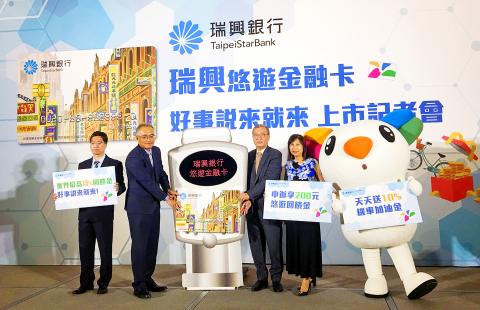EasyCard Corp (悠遊卡) yesterday unveiled its first cobranded automatic teller machine (ATM) card with Taipei Star Bank (瑞興銀行), part of its plans to expand its business scope in the face of stiff competition in the cobranded credit-card market.
EasyCard Corp has 19 cobranded credit cards.
“We will no longer focus on this [cobranded credit card] business, as the market is saturated,” Lin said.

Photo: CNA
With annual private consumption in Taiwan staying at about NT$9 trillion (US$292.28 billion) over the past few years, there seems to be no point in issuing more credit cards, Lin said.
“We always encourage people to make both ends meet, but that is not how credit cards work,” Lin said, adding that it is also a concern of Taipei Mayor Ko Wen-je (柯文哲).
Against this backdrop, the company aims to focus on non-credit card businesses, such as ATM cards and account-linked services for Easycards, with potential collaborations with local credit cooperatives, farmers’ associations, fishermen’s associations and Chunghwa Post (中華郵政), he said.
Asked if the company is interested in Internet banks in Taiwan, Lin said EasyCard might consider taking a 3 to 5 percent stake in a consortium led by Chunghwa Telecom Co (中華電信) to develop the nation’s first state-owned Internet-only bank.
Chunghwa Telecom has said that four companies with a combined stake of 79 percent in the consortium are interested in bidding for a Web-only bank license in Taiwan.
Chunghwa Telecom holds a 30 percent stake in the consortium, followed by Mega International Commercial Bank (兆豐銀行) with 25.1 percent, Shin Kong Financial Holding Co (新光金控) with 14 percent and Pxmart Co (全聯實業) with 9.9 percent.
EasyCard is the largest electronic stored value card in the nation.
As of the end of August, the number of EasyCards in circulation totaled 67.04 million, accounting for 64 percent of the 103.33 million electronic stored value cards in the nation, Financial Supervisory Commission data showed.
With its new cobranded ATM card, which serves as an electronic ticket and for making small payments, EasyCard said it expects students and young people to adapt it easily to diversify their payment choices.

CAUTIOUS RECOVERY: While the manufacturing sector returned to growth amid the US-China trade truce, firms remain wary as uncertainty clouds the outlook, the CIER said The local manufacturing sector returned to expansion last month, as the official purchasing managers’ index (PMI) rose 2.1 points to 51.0, driven by a temporary easing in US-China trade tensions, the Chung-Hua Institution for Economic Research (CIER, 中華經濟研究院) said yesterday. The PMI gauges the health of the manufacturing industry, with readings above 50 indicating expansion and those below 50 signaling contraction. “Firms are not as pessimistic as they were in April, but they remain far from optimistic,” CIER president Lien Hsien-ming (連賢明) said at a news conference. The full impact of US tariff decisions is unlikely to become clear until later this month

GROWING CONCERN: Some senior Trump administration officials opposed the UAE expansion over fears that another TSMC project could jeopardize its US investment Taiwan Semiconductor Manufacturing Co (TSMC, 台積電) is evaluating building an advanced production facility in the United Arab Emirates (UAE) and has discussed the possibility with officials in US President Donald Trump’s administration, people familiar with the matter said, in a potentially major bet on the Middle East that would only come to fruition with Washington’s approval. The company has had multiple meetings in the past few months with US Special Envoy to the Middle East Steve Witkoff and officials from MGX, an influential investment vehicle overseen by the UAE president’s brother, the people said. The conversations are a continuation of talks that

CHIP DUTIES: TSMC said it voiced its concerns to Washington about tariffs, telling the US commerce department that it wants ‘fair treatment’ to protect its competitiveness Taiwan Semiconductor Manufacturing Co (TSMC, 台積電) yesterday reiterated robust business prospects for this year as strong artificial intelligence (AI) chip demand from Nvidia Corp and other customers would absorb the impacts of US tariffs. “The impact of tariffs would be indirect, as the custom tax is the importers’ responsibility, not the exporters,” TSMC chairman and chief executive officer C.C. Wei (魏哲家) said at the chipmaker’s annual shareholders’ meeting in Hsinchu City. TSMC’s business could be affected if people become reluctant to buy electronics due to inflated prices, Wei said. In addition, the chipmaker has voiced its concern to the US Department of Commerce

STILL LOADED: Last year’s richest person, Quanta Computer Inc chairman Barry Lam, dropped to second place despite an 8 percent increase in his wealth to US$12.6 billion Staff writer, with CNA Daniel Tsai (蔡明忠) and Richard Tsai (蔡明興), the brothers who run Fubon Group (富邦集團), topped the Forbes list of Taiwan’s 50 richest people this year, released on Wednesday in New York. The magazine said that a stronger New Taiwan dollar pushed the combined wealth of Taiwan’s 50 richest people up 13 percent, from US$174 billion to US$197 billion, with 36 of the people on the list seeing their wealth increase. That came as Taiwan’s economy grew 4.6 percent last year, its fastest pace in three years, driven by the strong performance of the semiconductor industry, the magazine said. The Tsai